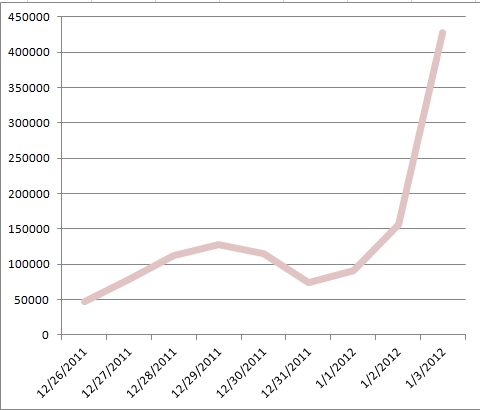
The big day in Iowa -- January 3, 2012
The day arrived; it was Iowa caucus day. And it was a very big day communicating via Twitter. The figure tells the tale. A very big spike.
 |
The number of messages posted to Twitter mentioning one of the seven candidates was 427,731. That is a very big day for tweeting about any political subject. If you want to know what people were 'saying' about the candidates it is there in 427K 140 character messages.
Another question is how this lined up with the outcome of the caucuses. I have the numbers for 4:00 p.m. CST and midnight. Here they are sorted from most to least messages about the candidate.
Candidate |
4:00 p.m. |
midnight |
% Causcus Vote |
Romney |
36,045 |
118,411 |
25% |
Santorum |
35,989 |
116,140 |
25% |
Ron Paul |
33,275 |
98,359 |
21% |
Gingrich |
10,289 |
35,073 |
13% |
Bachmann |
7431 |
38,117 |
5% |
Perry |
3586 |
18,532 |
10% |
Huntsman |
481 |
3,099 |
0% |
Romney 'won' by 8 votes. At 4:00 he was 56 messages ahead of Santorum. At midnight he was 2,371 messages ahead. Ron Paul was a 'comfortable' third, which is probably not the comfort he was looking for.
And down to the second tier. Gingrich led at 4:00 in Twitter messages mentioning him, but was topped by Bachmann at midnight. However, he was well ahead in votes. The Bachmann-Perry comparison seems very peculiar. Bachmann inspired more Twitter messages than did Perry, but she got only half as many votes. That probably results from the difficulty in searching; see methodological note.
Counting Twitter messages worked pretty well in this case. It might have worked even better if I had been trying a different seach procedure for messages mentioning Perry. I am going to have to change since he is off to South Carolina to pursue his dream.
However, this is only one electoral outcome. It is a 'weak reed' for generalizing.
After note
Now for a Twitter laugh: RT @Johnfugelsand: Remember, God told Herman Cain, Rick Perry, Newt & Michele Bachmann to run because God loves us & wants us to laugh.
Methodological note
There are too many Perrys in this world for a search using 'perry' to be efficient. It picks up too many references to Perrys other than the candidate. So I searched for 'rick perry'. That seemed to work when he was just getting started in September. But as he became better known 'perry' became much more widely used to designate a Twitter message about the candidate. I can do a check on the difference 'perry' and 'rick perry' make in searching. At 10:55 a.m. CST January 4 I did parallel searches. Twitter gives only 1,500 messages for any search so the question is how 'far back' did Twitter have to go to produce the 1,500 for each of the searches. The search for 'rick perry' found 1,500 messages between 10:21 and 10:55 or 34 minutes. The search for 'perry' found 1,500 references between 10:46 and 10:55 or nine minutes. The morning of January 4 one can be confident that virtually all of the messages found including 'perry' were about the candidate. But in October and November of 2011 that was much less clear. There is Katy Perry, after, all who is at least as frequently tweeted about as the candidate.
This is a general search problem. Imagine the diversity one would find by searching for 'paul.' So I search for 'ron paul,' and that seems to be effective in ruling out other Pauls, but surely misses some of the Twitter messages refering to the candidate. There are sufficiently few Romneys and Santorums and Bachmanns and Huntsmans of note in this world that a search using only the last name works pretty well.
The problem is more general than searches for names. There are many ways to make the same reference, and finding out what people are using is an important part of the research. You can be sure about hashtags, but you cannot be sure that hashtags are exhaustive. One has to cope as best on can.
© G. R. Boynton, January 4, 2012